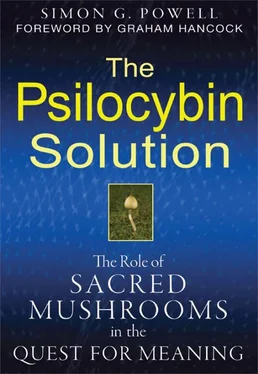The End of the World as We Know It
Not surprisingly, Terence McKenna echoed the mystical claims made by Teilhard. In the 1990s, McKenna assumed the unenviable role of psilocybinetic prophet by consistently claiming that human history will be utterly transformed in late December 2012. This date derived from his mathematical “fractal theory of time,” which views time as a cyclical patterning process involving a continual “ingression of novelty” and which also implies a definite culmination point. The date also coincides with the mysterious end date of the Mayan calendar, according to which a life cycle of some new kind will commence (this Mayan end-of-time prophesy was apparently not known to McKenna when he first developed his theory).
At this time, so said McKenna, the full purpose of reality will become manifest as information integration, or the ingression of novelty as he called it, reaches its zenith. There lies the “transcendental object,” the eschaton, which, like Teilhard’s Omega Point, casts reflections of itself into the past, reflections that inspire and illuminate saints, mystics, and the minds of visionary shamans. Also in line with Teilhard’s Omega Point, McKenna suggested that this future state of transcendence somehow exists now, or in eternity, and that it is toward this state that we and the reality process are being inexorably drawn. One can imagine the future state to be like a magnet, that the emergence of life and consciousness is akin to the process whereby iron filings assume structural alignment according to the nearness of a magnetizing influence. Indeed, all of Nature’s fortuitous self-organizational properties—like the emergence of the genetic code, for example—can been be seen as deriving from some future “magnetically charged” state that “pulls” these properties into being.
In terms of the Universal Computation idea we have been entertaining, the Omega Point (whenever it might occur) would represent the final output state or full rebirth of the Other within the biospherical system. The willed metamorphosis would be complete. The universal code will be fully expressed, with all information, all knowledge, achieving a state of coalescence. The Other, natural intelligence, will have completed its translation from one unified state of being into another.
McKenna also used the term attractor to describe this final eschatological state that life is eventually destined to reach. An attractor is a kind of abstract final state toward which physical systems are drawn. In the case of a swinging pendulum encountering friction, the attractor is the state of the system in which the pendulum is at rest. Regardless of the starting position, the pendulum always ends up in the attractor state. Likewise, in the case of chess, the attractor is the state of checkmate toward which the game invariably progresses. Attractors are thus inherent in various systems and are akin to the metaphorical magnet I previously described.
In terms of the Universe at large, it could be argued that the attractor toward which it is being inexorably drawn is a kind of “big crunch,” whereby the Universe collapses into an almighty singularity due to the effects of gravity. However, we can also view the attractor not as a super-concentration of “matter,” but as an integrated state of information or meaning. When human consciousness has succeeded in realizing its true role within reality, and when the Other has fully transformed itself within the collective psyche, then this will represent an attractor of the reality process. At this point, Nature will have made maximum sense of itself.
If we posit an attractor, we should also bear in mind that the nearer it is, the more marked and pronounced will the processes of self-organization be. This situation might explain recent and unusually rapid forms of evolution like that of the hominid cortex, as well as the subsequent speedy evolution of human culture and the more recent yearly evolution of digital technology. Dwelling on this, one automatically thinks of a spiral process, or self-tightening gyre, in which Nature is frantically assuming a state through which more and more information integration can take hold. Perhaps the end point of any biosphere is a kind of “local singularity,” alike in nature to the assumed singularity from which the Universe sprung, a state of informational unification, although this time embodied in a planetwide shared experience.
If such a fantastic phenomenon were to actually realize itself sometime in the near future, it would surely have to be preceded by a tremendous surge of information heralding the event. I do not mean angels blowing trumpets, but rather that scientists ought to make new discoveries that indicate the smartness of Nature. Or, if the paradigm of a naturally intelligent reality process were to be favored and explored in more depth, it would mean a reinterpretation of the data already amassed through science, and this might further highlight our unique position within the evolution of the cosmos. Alternatively, some new technological innovation or natural phenomenon might serve to make everyone more conscious of the interconnectedness of the biosphere, particularly the billions of minds that operate therein. This could then set the stage for synchronized global behavior and the dawn of a new value system and a new humanity. Either way, if the evolutionary process is indeed smart and destined to “conclude” in some way according to an inherent code, then it will simply have to proceed in the same way that an organism grows. Natural intelligence cannot be stopped; it can only be observed and appreciated while in action.
That we can experience the Other by ingesting psilocybin or by contemplating the intelligent properties of Nature indicates that something is indeed emerging within the collective human psyche, that some profoundly significant coherency lies beyond the chaos of secular fragmented reality. Or perhaps the Other has been dormant, as though asleep, hibernating as it were, only to gradually awaken through the vehicle of consciousness, which it has prepared for in advance.
I am the first to concede that much, if not more, mystery remains. But at least the mystery of our being has been more clearly defined. And at least we know where to look should we want to explore Nature more deeply than a casual glance allows. When one has encountered the Other through the visionary effects of a strong dose of psilocybin mushrooms, it becomes quite evident that, whatever the Other’s ultimate intent, consciousness is an essential part of the plan.
Our Role on the Earth Rock
Cultural conditions are ripe for a fresh look at Nature, which I consider to be an ultrasmart system. By so doing, the context in which we act out our lives becomes somewhat altered (another feedback effect). If we conceive of reality as a mindless material accident, then we will not think twice about ruthlessly exploiting Nature for short-term gain and short-term profit. Similarly, if we believe Nature can only be understood by tearing it to pieces and examining the smallest fragments, then we shall not divine the greater picture.
If, on the other hand, we embrace the ideas outlined in this book, our view of Nature might change and we might come to cherish Nature in the same way as aboriginal peoples. Of course, it is not necessary to entertain all the ideas in this book in order to be environmentally conscientious. Rather, should natural intelligence be deemed real, then we would do well to refrain from breaking harmony with its flow. If we veer too far from the ways of natural intelligence, we will run the risk of being abandoned by the great system that birthed us. Or worse, we might even jeopardize the future of all life on Earth.
Читать дальше










